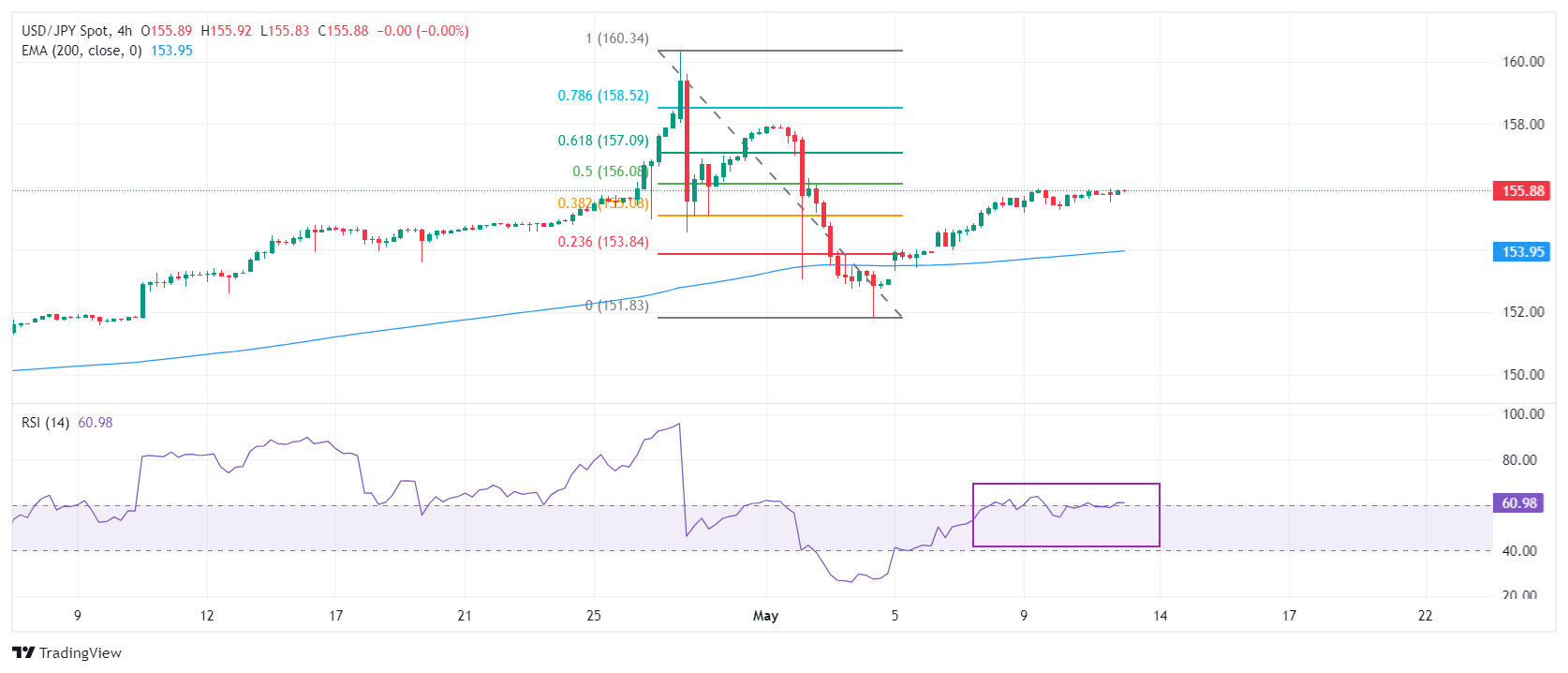- The Japanese Yen continues to fall due to investor uncertainty regarding the prolongation of the BoJ's monetary policy normalization process.
- It is estimated that the Japanese economy contracted 0.4% in the January-March period, showing a weak start to the year.
- The US dollar will dance to the data on inflation from US consumers and producers.
In the European session on Monday, the Japanese Yen (JPY) continued to fall to 156.00 against the US Dollar (USD). The USD/JPY pair is moving higher as investors fear that rising inflation in the Japanese economy is mainly due to the weakness of the yen, which should be driven by a wage growth spiral so that pressures on workers prices remain sustainably above the desired rate of 2%.
The Bank of Japan's (BoJ) Summary of Views (SOP) statement for the April meeting, released last week, indicated that inflationary pressures in Japan are mainly induced by the weakness of the Yen. Policymakers discussed possible scenarios for further rate hikes. One member said the degree of consumption recovery towards the second half of this year will be key when considering the timing of the next policy change.
This week, the outlook for the Japanese Yen will be guided by preliminary Japanese gross domestic product (GDP) data for the first quarter, due to be released on Thursday. Consensus suggests that the Japanese economy contracted 0.4% in the January-March period, after having expanded 0.1% in the last quarter of 2023. On an annualized basis, the Japanese economy is estimated to have contracted significantly by 1.5%.
Daily Market Moves Summary: Japanese Yen Weakens Despite Dollar Weakness
- The Japanese Yen extends its decline to near 156.00 against the US Dollar, even though the US Dollar is in decline due to growing concerns about the strength of the US labor market following weakness in Non-Farm Payrolls (NFP). ) in April, the decline in Job Offers in March and the large number of people who applied for unemployment benefits for the first time in the week ending May 3. The US Dollar Index (DXY), which tracks the dollar against six major currencies, is slightly below 105.30 points.
- In the current scenario, the easing of tense labor market conditions is unfavorable for the US Dollar and bond yields as it shows a weakening inflation outlook, reinforcing speculation about the return of the Federal Reserve (US Fed) to the normalization of monetary policy. CME's FedWatch tool shows that the September meeting will be the first in which interest rates will be lowered from their current range of 5.25%-5.50%.
- This week, investors will focus on the Producer Price Index (PPI), Consumer Price Index (CPI) and retail sales data for April in the United States. On Tuesday, US PPI data will be published, which will show the variation in prices of goods and services by business owners. Data on consumer inflation and retail sales will be released on Wednesday, providing new clues on the outlook for interest rates.
- Economists expect headline CPI and core CPI to rise 0.3% in April, down from March (0.4%). The annual headline CPI is expected to have dropped to 3.4% from 3.5% in March. In the same period, core inflation, which eliminates the volatility of food and energy prices, would slow to 3.6% from 3.8% previously.
- The good inflation data will offset investor optimism about a Fed rate cut in September based on easing labor market data. On the contrary, soft inflation figures will reinforce investor confidence that the Fed will reduce interest rates starting in September. Traders could increase bets that the Fed will begin lowering interest rates in July if inflation data slows more than expected.
Technical Analysis: Japanese Yen retraces 50% from multi-year low of 160.32

The Japanese yen retreats 50% from the April low of 160.32 against the US dollar, where investors suspect that Japanese authorities intervened. Investors suspected likely intervention after BoJ data suggested it spent nearly 60 billion yen to prevent a further decline. The USD/JPY pair fell to around 151.82 following suspicions of poaching.
The 200-period exponential moving average (EMA), currently trading near 156.00, acted as primary support for the US Dollar bulls. Support near the 200 EMA suggested that a positive long-term outlook is intact.
The 14-period RSI is around 60.00 points. A decisive break above this level will trigger bullish momentum.
Frequently Asked Questions about the Japanese Yen
What factors determine the price of the Japanese Yen?
The Japanese Yen (JPY) is one of the most traded currencies in the world. Its value is determined broadly by the performance of the Japanese economy, but more specifically by the policy of the Bank of Japan, the differential between the yields of Japanese and US bonds or the risk sentiment among traders, among other factors.
How do decisions by the Bank of Japan affect the Japanese Yen?
One of the mandates of the Bank of Japan is currency control, so its movements are key for the Yen. The BoJ has intervened directly in currency markets on occasion, usually to lower the value of the Yen, although it often refrains from doing so due to the political concerns of its major trading partners. The BoJ's current ultra-loose monetary policy, based on massive stimulus to the economy, has caused the depreciation of the Yen against its main currency pairs. This process has been exacerbated more recently by a growing policy divergence between the Bank of Japan and other major central banks, which have opted to sharply raise interest rates to combat decades-old levels of inflation.
How does the spread between Japanese bond yields and US bond yields affect the Japanese Yen?
The Bank of Japan's ultra-loose monetary policy stance has led to increased policy divergence with other central banks, particularly the US Federal Reserve. This favors the widening of the spread between US and Japanese 10-year bonds, which favors the Dollar against the Yen.
How does general risk sentiment influence the Japanese Yen?
The Japanese Yen is often considered a safe haven investment. This means that in times of market stress, investors are more likely to put their money in the Japanese currency due to its supposed reliability and stability. In turbulent times, the Yen is likely to appreciate against other currencies that are considered riskier to invest in.
Source: Fx Street
I am Joshua Winder, a senior-level journalist and editor at World Stock Market. I specialize in covering news related to the stock market and economic trends. With more than 8 years of experience in this field, I have become an expert in financial reporting.







